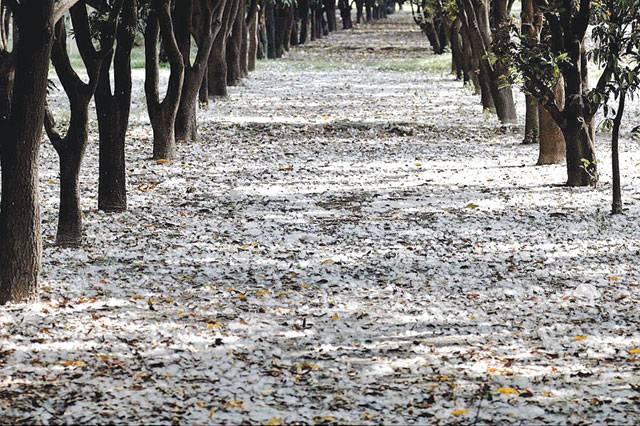LAHORE - As many as 15 districts of Punjab have been declared high risk areas by the World Health Organisation and United Nations Children's Fund (UNICEF) for the communicable diseases, gastroenteritis and diarrhoea. The warning has been issued based on reports showing alarming increase in the number of patients in these districts suffering from the above-mentioned diseases. The districts include: Lahore, Rawalpindi, Khushab, Gujranwala, Faisalabad, Kasur, Bahawalnagar, Multan, Muzaffargarh, DG Khan, Sialkot, Gujrat, Jhang, Mandi Bahuddin and Narowal. In some districts marked by the world health bodies and authorities in the Punjab the number of patients suffering from gastroenteritis and diarrhoea is 50 per cent higher than the previous year. According to the concerned health officials, between 30 to 40 patients suffering from these diseases are brought to the hospitals daily in Jhang, Faisalabad and Gujranwala districts. The list also included four districts that have been marked by Directorate General Health Services Punjab. They are: Gujrat, Mandi Bahuddin, Jhang and Narowal. The world bodies included these districts in their final list on the recommendation of DG Health. There is a serious threat of the outbreak of these diseases in the said districts, the WHO warned and directed the federal government to take immediate precautionary measures. The federal government further forwarded the warnings of the WHO and the UNICEF to the Punjab health officials through a letter. "Punjab is facing a heightened risk of communicable diseases' outbreak including diarrhoea. These diseases can be challenged and morbidity and mortality can be reduced by timely and comprehensive collection of data, early detection of diseases, through water sample testing and distribution of water purification tablets," the letter stated as the federal government issued new guidelines to the provincial government. The officials are further directed that top health priority be the provision of clean drinking water. A DG Health office source told The Nation that at present situation is worsening in three districts including Jhang, Gujranwala and Faisalabad, where increase in the number of patients suffering from gastroenteritis and diarrhoea is alarming. It is 50 per cent higher than the previous year, the source claimed, adding that between 30 to 40 patients suffering from these diseases are brought daily to the hospitals in these three districts. About provincial capital, the source said some localities situated in the Northern Lahore including Misri Shah, Shadbagh, Band Road, Kasurpura, Tajbagh, Faizbagh, Mar-zipura, Bagh Munshi Ladha and adjoining localities are being declared as highly sensitive areas due to dilapidated condition of sewerage system and unavailability of clean drinking water. A senior official and public health consultant in DG Health Punjab office, Dr Muhammad Saleem Rana, disclosed that the major source of gastroenteritis and diarrhoea in these high risk districts is contaminated water and damaged sewerage lines. He said a report compiled by the team of health officials and experts finding the source of these two diseases, has been submitted to the concerned authorities for further action. He said the directorate has received cholera kits from WHO with the directions of their further distribution to districts in Punjab to combat these diseases during coming monsoon and flood season. "Already kits are being distributed in each district to meet the emergency need regarding acute water diarrhoea/cholera control," Rana said. It is also learnt that in view of serious threat of expected outbreak of these communicable diseases, an emergency meeting of National Disaster Management Authority (NDMA) was held here the other day. The NDMA meeting issued directions to all the executive district officers (health) and medical superintendents of teaching hospitals, DHQs and THQs of the affected districts to take remedial measures from health point of view. They are directed to submit a comprehensive and consolidated flood plan along with a soft copy on CD, for the current year till May 10, 2008 without any delay. The NDMA meeting further directed the health officials to ensure availability of sufficient stock of essential medicines, vaccines like ARV, ASV, blood plasma expander, insecticide for vector control, water purification tablets, drips and ORS to meet any untoward situation. The health officials are warned that gastroenteritis/acute watery diarrhoea in Punjab is a major public health problem that causes many deaths each year especially during rainy season.
Thursday, April 18, 2024
15 Punjab districts declared high-risk areas

Mehwish Hayat says she would like to work with Aamir Khan
9:59 PM | April 18, 2024
'That'll be awesome,' Rohit Sharma on idea of Pakistan vs India Test series
9:17 PM | April 18, 2024
Turkiye commends Pakistan's efforts in fostering regional peace
9:03 PM | April 18, 2024
CM Maryam's security squad hits biker to death in Narowal
9:02 PM | April 18, 2024
Hafiz Naeemur Rehman sworn in as new emir of Jamaat-e-Islami
8:54 PM | April 18, 2024
Hepatitis Challenge
April 18, 2024
IMF Predictions
April 18, 2024
Wheat War
April 18, 2024
Rail Revival
April 17, 2024
Addressing Climate Change
April 17, 2024
Justice denied
April 18, 2024
AI dilemmas unveiled
April 18, 2024
Tax tangle
April 18, 2024
Workforce inequality
April 17, 2024
New partnerships
April 17, 2024
ePaper - Nawaiwaqt
Advertisement
Nawaiwaqt Group | Copyright © 2024





